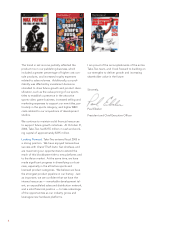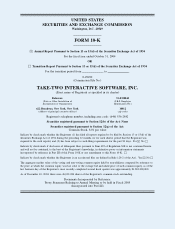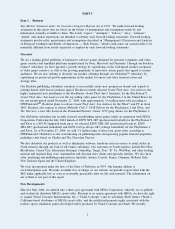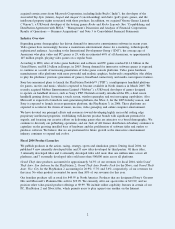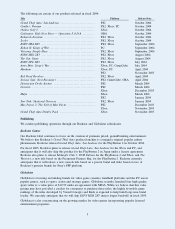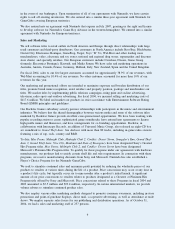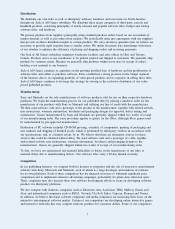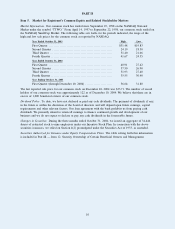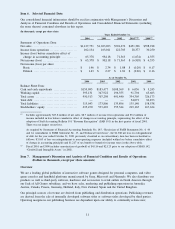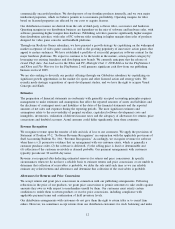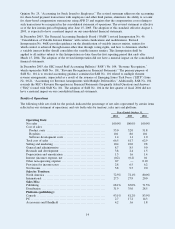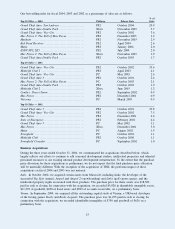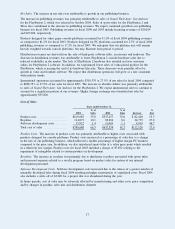2K Sports 2004 Annual Report Download - page 16
Download and view the complete annual report
Please find page 16 of the 2004 2K Sports annual report below. You can navigate through the pages in the report by either clicking on the pages listed below, or by using the keyword search tool below to find specific information within the annual report.
have greater financial, technical, personnel and other resources than we do, and are able to carry larger
inventories and make higher offers to licensors and developers for commercially desirable properties than we
can. Competition in the entertainment software industry is based on product quality and features; brand name
recognition; access to distribution channels; effectiveness of marketing; and price.
Retailers have limited shelf space and promotional resources, and competition is intense among an increasing
number of newly introduced entertainment software titles and hardware for adequate levels of shelf space
and promotional support. Competition for retail shelf space is expected to increase, which may require us to
increase our marketing expenditures to maintain current levels of sales of our titles. Competitors with more
extensive lines and popular titles may have greater bargaining power with retailers. Accordingly, we may
not be able to achieve the levels of support and shelf space that such competitors receive. Similarly, as
competition for popular properties increases, our cost of acquiring licenses for such properties is likely to
increase, possibly resulting in reduced margins. Prolonged price competition, increased licensing costs or
reduced operating margins would cause our profits to decrease significantly.
Competition for our titles is influenced by the timing of competitive product releases and the similarity of
such products to our titles and may result in loss of shelf space or a reduction in sell-through of our titles at
retail stores. Our titles also compete with other forms of entertainment such as motion pictures, television
and audio and video products featuring similar themes, online computer programs and other forms of
entertainment which may be less expensive or provide other advantages to consumers.
In our distribution business, we compete with large national companies such as Ingram Entertainment, as
well as smaller regional distributors. We also compete with the efforts of the major entertainment software
companies that distribute directly to retailers or over the Internet. Some of our competitors have greater
financial, technical, personnel and other resources than we do, and are able to carry larger inventories, adopt
more aggressive pricing policies and provide more comprehensive product selection than we can.
Intellectual Property
We develop proprietary software titles and have obtained the rights to publish and distribute software titles
developed by third parties. We attempt to protect our software and production techniques under copyright,
trademark and trade secret laws as well as through contractual restrictions on disclosure, copying and
distribution. Although we generally do not hold any patents, we obtain trademark and copyright registrations
for our products.
Interactive entertainment software is susceptible to piracy and unauthorized copying. Unauthorized third
parties may be able to copy or to reverse engineer our titles to obtain and use programming or production
techniques that we regard as proprietary. Well organized piracy operations have proliferated in recent years as
a result of the ability to download pirated copies of our software over the Internet. Although we attempt to
incorporate protective measures into our software, piracy of our products could negatively impact our future
profitability. In addition, our competitors could independently develop technologies substantially equivalent or
superior to our technologies.
As the amount of interactive entertainment software in the market increases and the functionality of this
software further overlaps, we believe that interactive entertainment software will increasingly become the
subject of claims that such software infringes the copyrights or patents of others. From time to time, we
receive notices from third parties or are named in lawsuits by third parties alleging infringement of their
proprietary rights. Although we believe that our titles and the titles and technologies of third-party developers
and publishers with whom we have contractual relationships do not and will not infringe or violate proprietary
rights of others, it is possible that infringement of proprietary rights of others may occur. Any claims of
infringement, with or without merit, could be time consuming, costly and difficult to defend.
International Operations
Sales in international markets, principally in the United Kingdom and other countries in Europe, have
accounted for a significant portion of our revenues. For fiscal 2004 and 2003, sales in international markets
accounted for approximately 27.5% and 27.9%, respectively, of our revenues. We are subject to risks inherent
in foreign trade, including increased credit risks, tariffs and duties, fluctuations in foreign currency exchange
8


